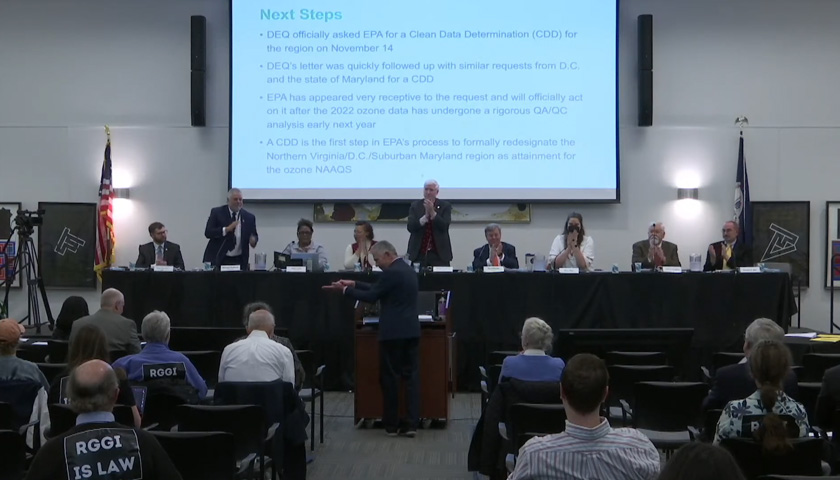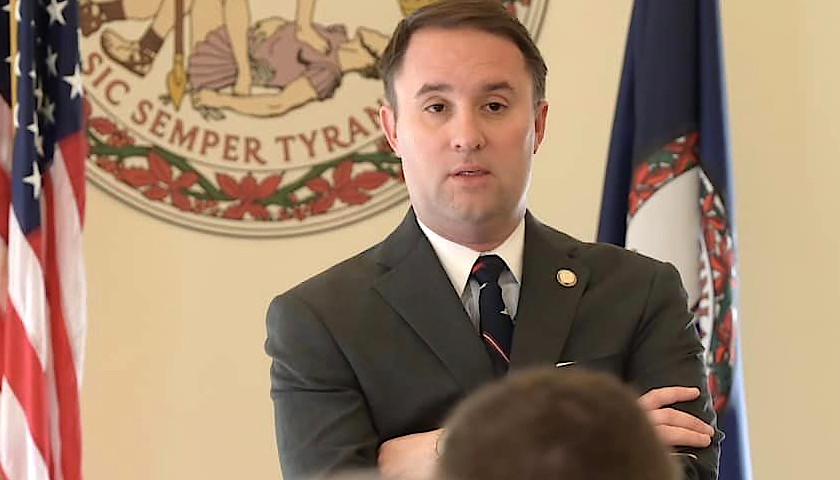The Virginia Air Pollution Control Board voted four to one with two abstentions on Wednesday to advance a regulatory repeal of the Commonwealth’s participation in the Regional Greenhouse Gas Initiative (RGGI), with completion targeted for the end of 2023.
The program requires utilities in participating states to bid on carbon allowances, and withdrawal from the program has been a top goal of Governor Glenn Youngkin since before he took office. Republicans argue that utilities will pass the costs on to consumers, and Democrats highlight funds raised through the program for flood protection and coastal resilience.
Participation in the program was begun through legislation passed by the General Assembly, and before he left office, former Attorney General Mark Herring issued a formal opinion saying the governor doesn’t have authority to withdraw from the program without legislative action.
The Office of the Attorney General (OAG) has resisted publishing an opinion purportedly from current Attorney General Jason Miyares despite a lawsuit from the Southern Environmental Law Center and Appalachian Voices. But Deputy Attorney General Ross Phillips told the board Wednesday, “I have reviewed the proposed regulation and determined that the Board has the authority to adopt the proposed regulation set forth in agenda tab ‘F.'”
Before voting on the measure, board member Hope Cupit said, “I do not agree with the Attorney General’s assessment. I’ve tried very hard to understand why this action is even before us.”
Cupit said she didn’t understand why the board was even voting on repealing RGGI involvement since it was mandated by the General Assembly.
“I will uphold the rule of law so that I maintain public trust in the work that I do for this Air Board. I therefore must abstain from voting today as I do not believe that we as members of the Air Board have the legal authority to do so,” Cupit said.
Member Lornel Tompkins, who also abstained, echoed those concerns. Board member Staci Rijal said she would vote no, calling for a Department of Environmental Quality analysis of the regulatory change, and said there isn’t sufficient public information currently available.
Other members supported RGGI withdrawal.
Board member David Hudgens called it a “back-door” tax, and noted that the General Assembly has the power to fund resiliency programs.
“If it’s important, your political leaders ought to vote for the tax to make it happen, and not depend on your electric bill. That is unfair to people who cannot afford the electricity today,” he said.
Board Chair James Patrick Guy II said, “First as to the legality of our action, oddly enough, as an attorney of 32 years, I don’t think this board or I am confident to make that determination. That has to come from the Office of the Attorney General, and it’s very clear what that office has determined. The second thing that is outside our purview is anything that doesn’t relate to air pollution control, and so to the extent that there are second our impacts to us making a decision regarding how to regulate air pollution control, those lie within the purview of the governor and the secretariat and the General Assembly. It’s not the job of the Virginia Air Pollution Control Board to fix problems other than air pollution control.”
With the board’s approval, the regulation will now be submitted to Governor Glenn Youngkin for approval, before the regulation is published for a final public comment period.
– – –
Eric Burk is a reporter at The Virginia Star and The Star News Network. Email tips to [email protected].
Photo “Virginia Air Board Meeting” by Virginia DEQ.





